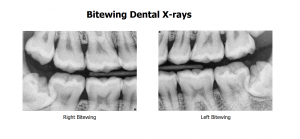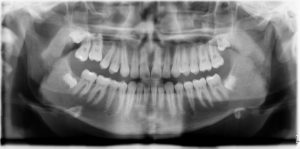 HOME
HOMELike most x-rays, we take them to see what’s going on in areas that we can’t see with our own eyes. Sometimes, things can be going on below the gum line that we can’t see. For insrance, you may have caries in a tooth, but we need to see how deep it goes. We also use x-rays for treatment planning, especially with orthodontics. This is so we can figure out which way the teeth may track with a dental appliance fitted.
We generally only take x-rays when clinically necessary, to reduce a persons exposure to radiation. But, we also like to keep on top of any underlying issues that may become big problems in the future. Therefore, we generally take routine x-rays every 2 years. If you have a wonderfully clean mouth with little or no dental treatment history, we can stretch this to 3 – 4 years.
We also take them if you are in pain and we can’t see any obvious issue for it by looking in your oral cavity.
Routine x-rays are called bitewings (pictured below). These allow us to see as much as possible whilst using the smallest dose of radiation possible.

This x-ray is called an OPG (Orthopantomography) x-ray, and gives us a clear picture of the entire mouth. This includes the jaw, the jaw joints, the sinus, bone levels, teeth, nerves, and much more.

In a word, yes. Dental x-rays are a common diagnostic procedure that is considered extremely safe. Digital dental x-rays have very low doses of radiation, producing just a fraction of what you are exposed to in other imaging procedures. When these x-rays are performed properly with adequate safety precautions in place, there’s very little cause for concern. A routine examination with four bitewing x-rays exposes you to roughly the same amount of radiation you will experience during one to two hours on an plane.
Pregnant women are generally advised to avoid dental x-rays. Though the radiation is minimal, it’s best to avoid all exposure when possible for the health of the developing fetus. For this reason, it’s important to tell your dentist if you are or may be pregnant.
However, there are some instances where pregnant women should still have dental x-rays performed. If you have a dental emergency or are in the middle of a dental treatment plan, you may still need x-rays during your pregnancy. Discuss the issue with your dentist to determine the best way to proceed. It’s crucial that you balance both your dental and prenatal health. Women with periodontal disease are at a higher risk of adverse pregnancy outcomes, so you shouldn’t neglect your teeth during pregnancy.
There’s really nothing to worry about when having a dental x-ray. They’re perfectly safe, and we always keep the dose as low as reasonably possible.
If you have any questions or would like to make an appointment, please do not hesitate to call us on 0121 550 6958.
Clare
Back to Blog| Cookie | Duration | Description |
|---|---|---|
| cookielawinfo-checkbox-advertisement | 1 Year | The cookie is set by GDPR cookie consent to record the user consent for the cookies in the category "Advertisement". |
| cookielawinfo-checkbox-analytics | 11 months | This cookie is set by GDPR Cookie Consent plugin. The cookie is used to store the user consent for the cookies in the category "Analytics". |
| cookielawinfo-checkbox-necessary | 11 months | This cookie is set by GDPR Cookie Consent plugin. The cookies is used to store the user consent for the cookies in the category "Necessary". |
| cookielawinfo-checkbox-other | 1 year | Set by the GDPR Cookie Consent plugin, this cookie is used to record the user consent for the cookies in the "Other" category . |
| viewed_cookie_policy | 11 months | The cookie is set by the GDPR Cookie Consent plugin and is used to store whether or not user has consented to the use of cookies. It does not store any personal data. |
| Cookie | Duration | Description |
|---|---|---|
| _ga | 2 Years | This cookie is installed by Google Analytics. The cookie is used to calculate visitor, session, campaign data and keep track of site usage for the site's analytics report. The cookies store information anonymously and assign a randomly generated number to identify unique visitors. |
| _gat_gtag_UA_135273458_1 | 1 Minute | This cookie is set by Google and is used to distinguish users. |
| _gid | 1 Day | This cookie is installed by Google Analytics. The cookie is used to store information of how visitors use a website and helps in creating an analytics report of how the website is doing. The data collected including the number visitors, the source where they have come from, and the pages visted in an anonymous form. |
| vuid | 2 years | Vimeo installs this cookie to collect tracking information by setting a unique ID to embed videos to the website. |
| Cookie | Duration | Description |
|---|---|---|
| _fbp | 3 months | This cookie is set by Facebook to deliver advertisement when they are on Facebook or a digital platform powered by Facebook advertising after visiting this website. |